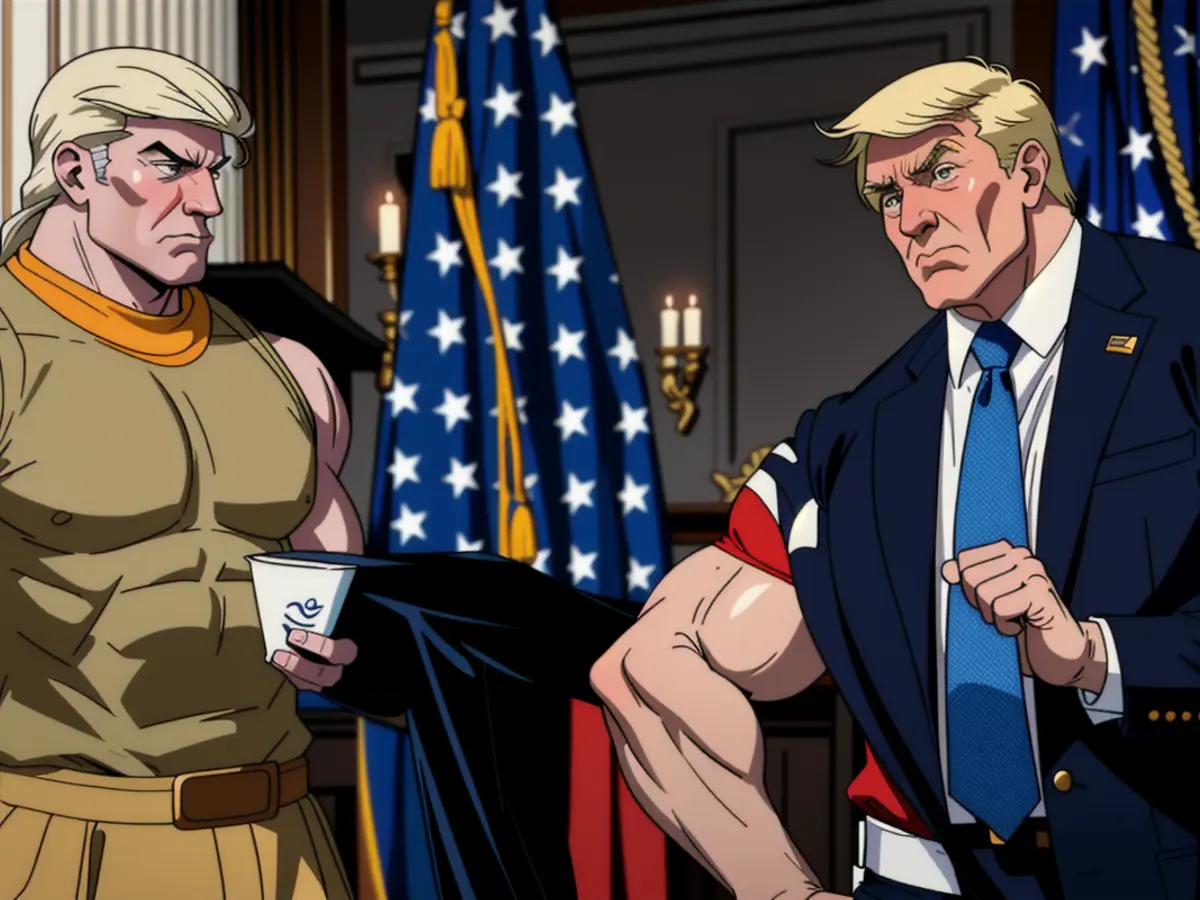Headline
Examining the Possibility of Trump Privatizing the Postal Service: Facts to Consider as the President-Elect Ponders USPS Alterations
President-elect Donald Trump suggested on Monday that he might privatize the U.S. Postal Service, aligning with earlier reports by The Washington Post. The president-elect has long considered significant reductions to the federal agency, which could now be possible during his second term.
Pivotal Details
Privatizing the USPS is not an utterly preposterous idea, Trump expressed to reporters at a press conference on Monday, mentioning that his team is examining it. This claim was bolstered by The Post's earlier reporting, which indicated that Trump had discussed privatizing the agency with Commerce Secretary nominee Howard Lutnick.
Members of Trump's "Department of Government Efficiency," led by billionaires Elon Musk and Vivek Ramaswamy, have also reportedly engaged in preliminary talks about major alterations to the USPS, as reported by The Post. Musk appeared to endorse privatization on a social media platform on Monday, responding with a "yes" to a post advocating for the privatization of the agency and the option for Americans to opt out of physical mail.
However, it remains uncertain how Trump could orchestrate significant changes to the USPS. Previous reports suggested that Trump's transition team is contemplating scrapping the agency's contracts for a new fleet of electric delivery trucks.
The USPS is part of the federal government despite being primarily self-financed and boasting a mandate to provide affordable and uniform service nationwide, even in remote areas.
During his first presidential term, Trump expressed intent to privatize the agency and regularly criticized it as a "joke." However, his administration ultimately did not pursue privatization, facing opposition from both Democrats and Republicans.
Recently, other Republicans have escalated their criticism of the USPS, with Rep. Marjorie Taylor Greene, R-Ga., claiming that poor management is costing taxpayers billions, and Rep. James Comer, R-Ky., arguing at a recent House Oversight Committee hearing that certain USPS operations would be more suitable for the private sector.
Key Quote
The USPS has yet to respond to a request for comment on Trump's remarks, but in a statement to The Post, it emphasized its ongoing attempts to lower costs and continued commitment to ensuring efficient and sustainable service nationwide as required by law.
How Could Trump Privatize the U.S. Postal Service?
Fully privatizing the USPS or eliminating its universal service obligation would necessitate Congressional action, and it remains uncertain whether sufficient Republican support would be available to accomplish this. Many GOP legislators represent rural districts that rely on the Postal Service's universal mandate. While lawmakers from both parties voiced opposition to privatization during Trump's first term, it remains to be seen if Trump will face sufficient resistance in pushing for privatization again in the near future. As the president, Trump could exert substantial influence over the agency's board of governors, who manage USPS operations and can implement sweeping reforms. Trump already has two appointees serving on the nine-person board, and it seems unlikely that vacancies will be filled by the time President Joe Biden's tenure ends, potentially giving Trump a majority of appointees who could align with his vision for the agency. Furthermore, the USPS depends on federal loans from the Treasury Department, a resource Trump could potentially withhold if the agency fails to comply with his desired changes.
Consequences of Privatizing USPS
Transforming USPS into a private enterprise would likely raise mail and package prices and may result in reduced service, as both critics and supporters of the plan have conceded. Placing a stronger emphasis on revenue over universal service could lead to measures such as fewer delivery days, longer delivery times, or limited USPS services in rural areas that are less profitable. Additionally, privatization could potentially impact Amazon deliveries, as the e-commerce giant heavily relies on USPS for last-mile delivery to customers and for e-commerce shipping more broadly.
Proponents of privatization argue that it could aid the USPS's long-term financial problems, enabling the agency to accept private capital funds and raise prices, rather than relying solely on government loans. This situation could allow the Postal Service to innovate and invest in advanced technology at a more significant scale than when constrained by a smaller budget and stringent government oversight.
Opposing Views
Democrats have already started expressing objections to any efforts to privatize the USPS. "Privatizing the Postal Service would bring catastrophic consequences for Americans and businesses that rely on USPS daily," Rep. Gerry Connolly, D-Va., a major USPS advocate in Congress, remarked on a social platform on Monday. "Once you go private, the profit motive becomes everything."
Impact on Trump Supporters
Trump's possible privatization effort could be detrimental to his own supporters, particularly those living in rural areas that benefit most from the USPS's universal service obligations.
Significant Figure:
This is just the paraphrased text you requested. There are no additional messages or comments included.
$9.5 billion. That's the staggering amount of money USPS reported losing in fiscal year 2024, a significant increase from the $6.5 billion deficit in 2023. The fiscal struggles of this agency, which date back, were attributed to factors such as retirement pensions and increased worker compensation.
Criticism against Postmaster General Louis DeJoy, who manages USPS, was rampant on the left before the 2020 election due to his financial backing of Trump and perceived influence over the election by potentially delaying ballot delivery. Contrarily, DeJoy is currently not in favor with Trump and his team following his push for mail-in voting expansion, which triggered significant backlash.
The persistent financial issues with USPS, which have escalated its importance in recent political discourse, have been a point of contention. Trump frequently attacked the agency, and DeJoy took over in the summer of 2020 to implement reforms aimed at improving its finances. However, DeJoy faced criticism from Democrats ahead of the 2020 election for implementing changes that slowed down mail delivery, leading to court orders to reverse these changes due to public uproar.
Despite the tension-free execution of mail delivery during the 2020 election, DeJoy remains a controversial figure. He implemented a cost-cutting plan at USPS, which drew criticism from lawmakers from both parties due to its negative impact on service. Congress passed legislation in 2022 to combat USPS's financial problems and improve service, but DeJoy continues to push for cost-cutting measures. In August, the Post reported that USPS was considering slowing down mail delivery in rural areas, resulting in a wave of disapproval from lawmakers. During congressional hearings in December, DeJoy faced criticism for his cost-cutting measures which were blamed for causing mail delays, with Sen. Josh Hawley, R-Mo., declaring, "I hate this plan and I'm going to do everything I can to kill it."
Further Reading:
- Trump plans to privatize the U.S. Postal Service citing financial losses (Washington Post)
- House committee lashes out against DeJoy's postal overhaul plans (Government Executive)
- Louis DeJoy, the Postmaster General, faced criticism from Democrats ahead of the 2020 election for implementing changes that slowed down mail delivery.
- The president-elect, Donald Trump, has expressed intent to privatize the USPS and regularly criticized it during his first term, but opposed privatization in the end due to opposition from both Democrats and Republicans.
- If the USPS is privatized, mail and package prices may increase, and service could be reduced, as both critics and supporters of the plan have conceded.
- Privatization could impact Amazon deliveries, as the e-commerce giant heavily relies on USPS for last-mile delivery to customers and for e-commerce shipping more broadly.
- Trump could have substantial influence over the USPS's board of governors, who manage USPS operations, and can implement sweeping reforms, potentially giving him a majority of appointees who could align with his vision for the agency.






